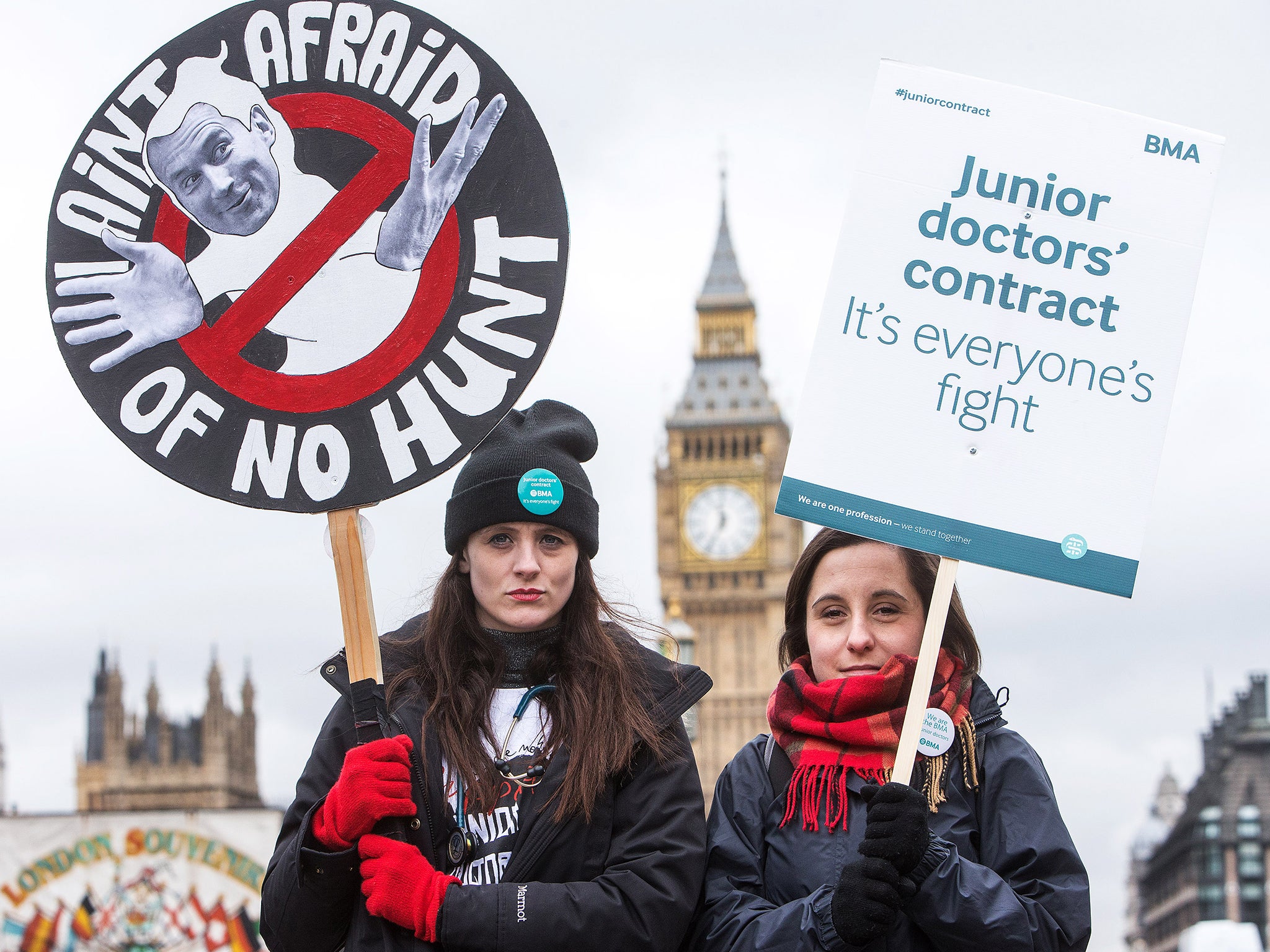The health crisis is about more than junior doctors on strike. We need a public movement to save our NHS
The junior doctors' contract is really about the restructuring of the workforce to bring down the wage bill, opening up an £100bn oyster for profit

Your support helps us to tell the story
From reproductive rights to climate change to Big Tech, The Independent is on the ground when the story is developing. Whether it's investigating the financials of Elon Musk's pro-Trump PAC or producing our latest documentary, 'The A Word', which shines a light on the American women fighting for reproductive rights, we know how important it is to parse out the facts from the messaging.
At such a critical moment in US history, we need reporters on the ground. Your donation allows us to keep sending journalists to speak to both sides of the story.
The Independent is trusted by Americans across the entire political spectrum. And unlike many other quality news outlets, we choose not to lock Americans out of our reporting and analysis with paywalls. We believe quality journalism should be available to everyone, paid for by those who can afford it.
Your support makes all the difference.Who could have predicted this time last year that the junior doctors' strike would be spearheading the anti-austerity movement? Or that the Tories would be in crisis, less than a year on from an apparently triumphant election victory? When I wrote my book, How to Dismantle the NHS in 10 Easy Steps, I never anticipated that tens of thousands of junior doctors would be mobilising to defend the NHS.
We are now seeing a decisive escalation of industrial action with a looming full-out strike. However, the BMA leadership has made it clear that it does not want to talk about the bigger picture of privatisation. Campaign groups, such as NHS Survival, talk of the de-politicisation of the NHS. This is an absurd position when you are taking on the government; no issue could be more political.
Limiting the debate to the small print of a contract ignores that this is just the latest part of a massive 30-year project of NHS privatisation. Ultimately, it will prove fatal – and the dispute will end with a compromise, or complete failure.
In fact, the junior doctor contract can only be understood in the context of privatisation. The contract is really about the restructuring of the workforce to bring down the wage bill. It is designed to increase profit margins paving the way for privatisation. If the contract is implemented, then similar contracts will follow for all NHS staff. The attack on pay and conditions is also about breaking the allegiance of NHS staff to the concept of a public, universal healthcare system. And that is why doctors are prepared to leave the NHS in droves if it is imposed upon them.
Public opinion is firmly behind the doctors. However, the doctors’ movement must now generalise into a national movement to save the NHS from privatisation. The government will exploit any opportunity to shift public opinion, so the BMA would do well to learn from its motto: it’s everyone's fight.
Over the past few months, I've seen the NHS from both sides – as a doctor, and as a patient. I've been receiving intensive treatment for a serious illness, on occasion coinciding with strike days. Knowing that industrial action is about saving our NHS means that I have been wholeheartedly behind my colleagues.
We are up against an establishment intent on opening up an £100bn-plus oyster for profit. We are in for a fight against powerful forces. We need to change the terms of the debate at this critical moment. Only the bigger picture of privatisation will mobilise public opinion.
We need to use simple messages to explain what privatisation means when services remain free at the point of delivery – the selling off of the NHS to corporations to profit from illness and the expansion of private health insurance.
However, we cannot rely on any one organisation to save our NHS. Jeremy Corbyn’s leadership of the Labour party presents a window of opportunity, but he is facing a Blairite parliamentary Labour party still in love with market ideology. Only a mass public movement could pressure Labour to change its official line on the NHS.
The movement needs an NHS manifesto. As a minimum, this should demand fair contracts with decent pay and conditions that value all NHS staff, reinstating the student nursing bursary, reversing privatisation, repealing the Health & Social Care Act and restoring the NHS so it is publicly owned, run and funded.
A movement would need to link up NHS staff with other public sector workers, too. We are already seeing solidarity with the student nursing campaign to reinstate the bursary, Bursary or Bust, and with teachers who are appalled at plans to turn all schools into academies.
This is a good start; it is a launch pad for a mass movement to save the NHS, and to put an end to austerity for good.
Youssef El Gingihy is a GP and author. How to Dismantle the NHS in 10 Easy Steps is published by Zero books
Join our commenting forum
Join thought-provoking conversations, follow other Independent readers and see their replies
Comments